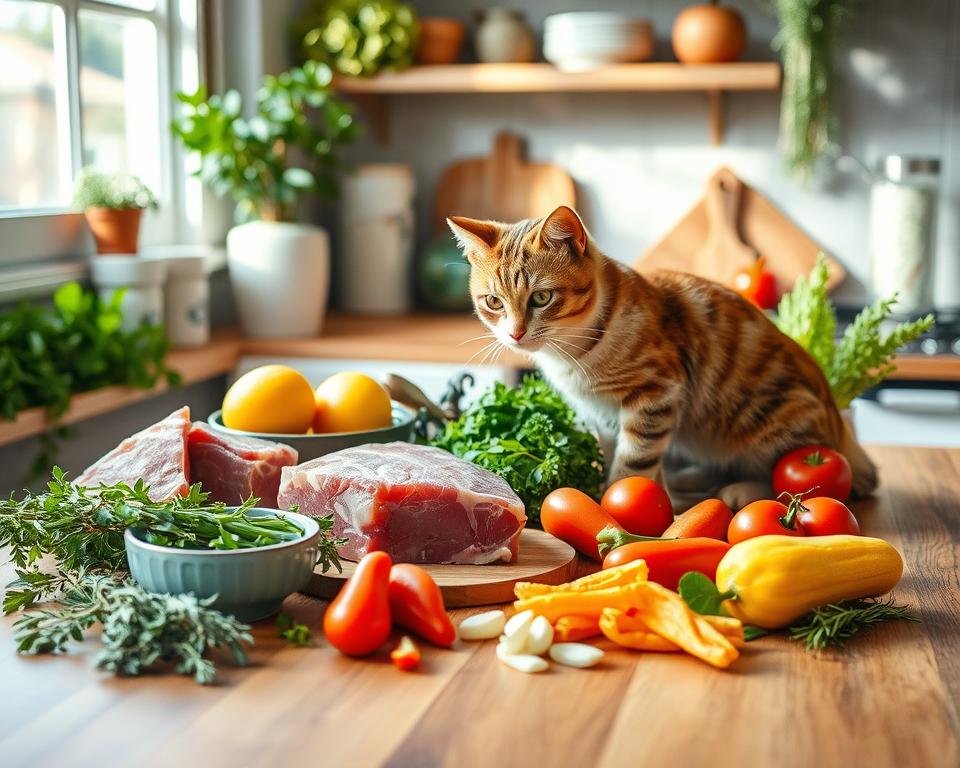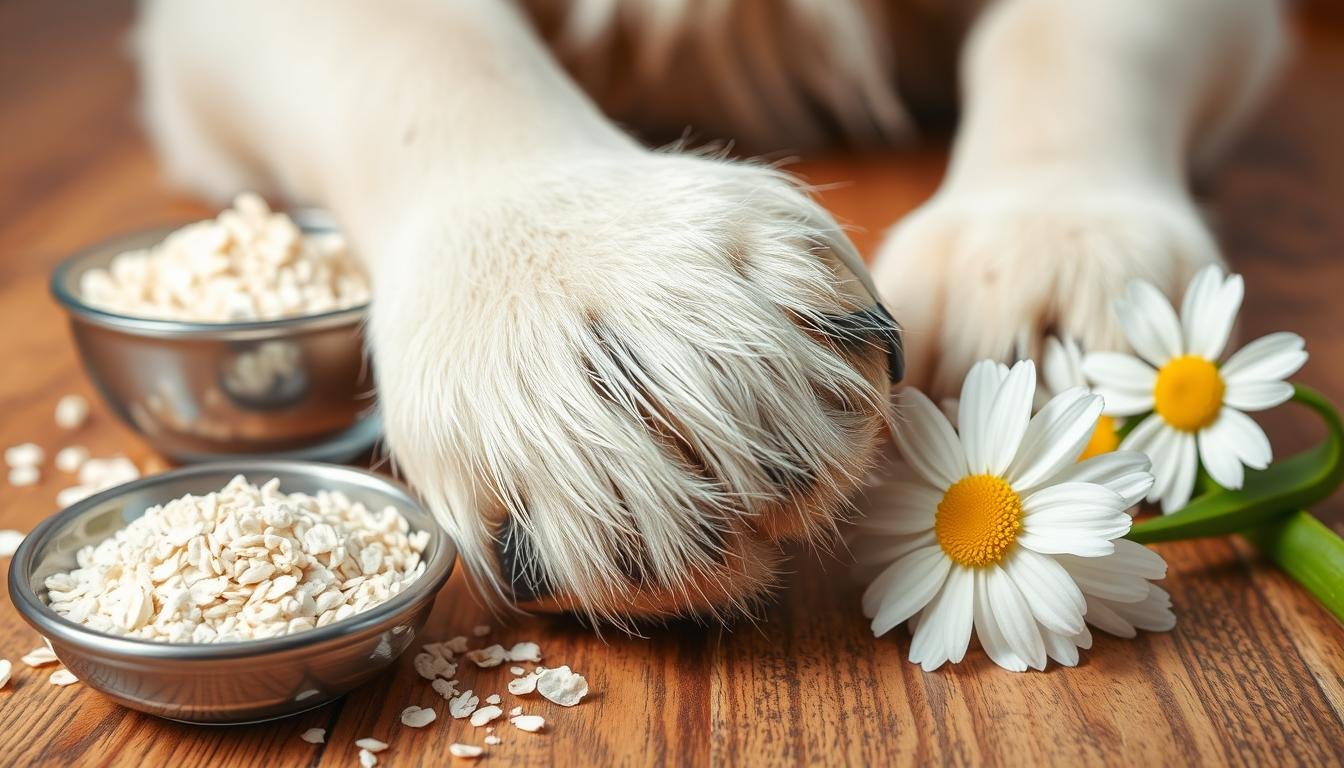Cats are meat-eaters and need a diet rich in protein. They should eat foods that are similar to their natural prey. This means lots of meat and some fiber, but not too many carbs.
Studies show that eating like wild cats can help with obesity and behavior problems. A natural diet can make your cat happy and healthy.
Feeding your cat in a way that mimics hunting can be very beneficial. Adding fun to mealtime with puzzles and play can make eating better for them. Knowing when to switch to a natural diet is key to keeping your cat healthy.
Understanding Natural Cat Diets and Their Importance
Cats are obligate carnivores, meaning they need a diet rich in animal protein. A natural diet for cats includes lots of protein, some fat, and very little carbs. Knowing what protein and nutrients are key can help keep your cat healthy.
What Defines a Natural Diet for Cats
A natural diet for cats is based on what they ate in the wild. It’s high in animal protein, moderate in fat, and low in carbs. There are different types of cat food, each with its own nutritional profile.
The Role of Protein in Cat Nutrition
Protein is vital for cats because they are meat-eaters. They need high-quality protein from sources like meat, poultry, and fish. This is because cats use protein for energy and other important functions.
Essential Nutrients in Natural Diets
A natural diet also includes vitamins, minerals, fatty acids, and amino acids. These nutrients help with a cat’s health, from their immune system to their skin and coat. Food makers follow Feline Nutrition Expert Subcommittee and AAFCO guidelines to ensure these needs are met.
“A balanced, natural diet is key for a cat’s health. It provides essential nutrients for their body’s functions and supports their overall well-being.”
Signs Your Cat Needs to Switch to a Natural Diet
Keeping an eye on your cat’s diet is key for their health. Cats may show signs of cat health issues or dietary problems in cats needing a natural diet. Obesity is a common sign, leading to more health problems if not fixed. Digestive issues like vomiting or diarrhea also hint at a need for a natural diet.
Low energy and a bad coat can mean feline nutritional deficiencies. Cats with food allergies or sensitivities might itch a lot, lose hair, or have stomach problems. Changes in behavior, like being more aggressive about food or being very tired, can also mean it’s time for a diet change. Watching your cat’s weight and health closely is key to knowing when to change their diet.
“Transitioning your cat to a natural diet is an important step in supporting their overall health and well-being.”
By noticing these signs, you can act early to meet your cat’s dietary needs. Switching to a natural diet can greatly improve your cat’s life quality.
When Should I Put My Cat on a Natural Diet
Deciding to switch your cat to a natural diet is important. It depends on their life stage, health, and behavior. Knowing these factors helps make the change easier and better for your cat.
Age-Related Dietary Changes
Cats grow and change as they get older. Kittens need lots of calories and nutrients for growth. Adults need less but high-quality protein to keep muscles strong.
Senior cats do best with easy-to-digest food. This helps prevent obesity and health problems.
Health Condition Indicators
Some health issues, like obesity or diabetes, might mean a natural diet is needed. These diets can help manage symptoms and improve health. Always talk to your vet to find the right diet for your cat’s health.
Behavioral Changes That Signal Diet Issues
Behavior changes can show your cat’s diet needs a tweak. If they eat less, drink more water, or change litter box habits, it’s time to think about a natural diet. Talking to your vet about these signs can help decide the best diet for your cat.
Choosing a natural diet for your cat should be a team effort. You and your vet should consider your cat’s age, health, and behavior. Making smart choices about their food helps your cat live a long, healthy life.
“A balanced, natural diet is essential for cats to maintain optimal health and well-being throughout their lives.”
Benefits of Natural Diet for Cats
Switching your cat to a natural diet offers many cat health benefits. One key advantage is improved digestive health. Natural diets, without artificial additives, can lower the risk of stomach problems and food allergies. This lets your cat absorb nutrients better.
Also, natural diets help with better weight management. They have the right mix of nutrients and avoid too many carbs. This is important because too many carbs can lead to obesity in cats, a big problem in the U.S.
Enhanced Energy Levels
A natural diet also boosts your cat’s energy levels and overall health. The better ingredients and balanced nutrition in natural foods support your cat’s health. This leads to more activity, a shinier coat, and better dental health.
The higher moisture in wet natural foods also helps with urinary health and keeps your cat hydrated. This can lower the risk of chronic diseases.
“Cats are obligate carnivores, requiring meat to get all necessary nutrients such as Taurine and Arginine.”
Transitioning Your Cat to Natural Food
Switching your cat to natural food is a slow but rewarding journey. Start by mixing 75% of their old food with 25% of the new. This slow introduction helps their stomach adjust and prevents upset.
When adding a new diet, make sure to keep your cat hydrated. You can do this by feeding wet food or adding water to dry food. Also, stick to a regular feeding schedule. This helps your cat adjust better. Choose high-quality, human-grade cat food for the best nutrition.
Cats may not like raw meat at first, so get creative. Try putting food on their paws or hiding it for them to find. With patience and careful monitoring, your cat will thrive on a natural diet.



